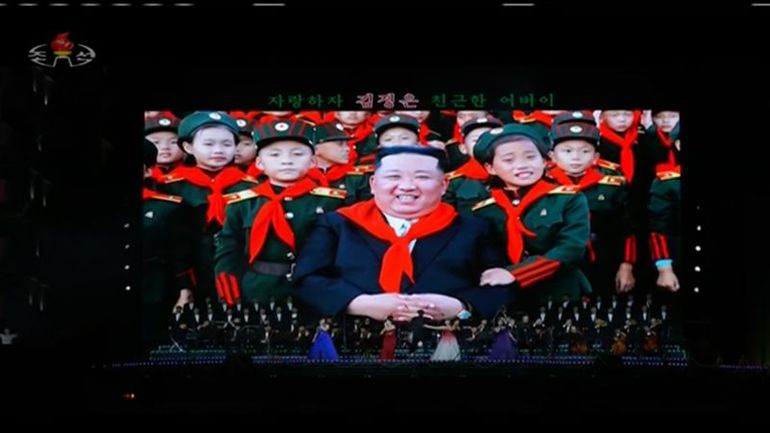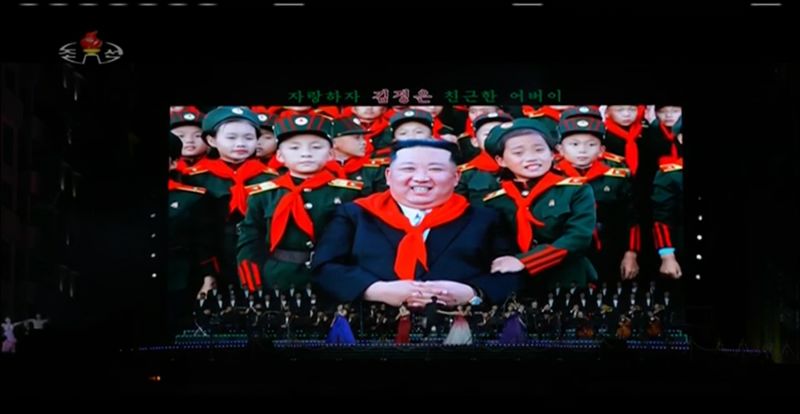
South Korea's Ban on a Viral TikTok Song Praising Kim Jong Un

Discover why South Korea has taken action to ban a TikTok sensation featuring a North Korean propaganda song glorifying Kim Jong Un as a remarkable leader and caring figure. The tune's widespread popularity on TikTok, with various remixes and dance routines amassing millions of views, prompted South Korea to label it as a tool for psychological warfare.
A popular North Korean propaganda song praising Kim Jong Un as a great leader and caring parent has gained widespread attention on TikTok. Mashups and dance videos featuring the song have received millions of views, resulting in South Korea prohibiting the tune due to concerns of psychological warfare.
Seoul’s media regulator recently announced that it would be restricting access to various versions of the catchy propaganda hit known as "Friendly Father," which unexpectedly became a sensation on social media platforms.
The song was introduced in April at a nighttime concert celebrating the finishing of a housing project in the capital Pyongyang, as reported by North Korean state-run Korean Central News Agency.
The lyrics of the song applaud Kim, the third-generation leader of one of the most authoritarian nations in the world, as "a great leader and a friendly parent." The music video shows North Koreans joyfully singing along to the orchestral song, expressing that Kim "takes care of us with affection."
North Korean propaganda is not a new phenomenon. However, what made "Friendly Father" stand out this time was that it was posted on TikTok, which is owned by Chinese internet giant ByteDance. The song quickly became popular as content creators worldwide made their own versions of the music video, adding dances and lighthearted captions to their short one-minute clips on the platform. These videos collectively received over 2 million views.
Despite its popularity on TikTok, "Friendly Father" did not necessarily turn out to be a successful propaganda tool for Pyongyang.
Alexandra Leonzini, a researcher at Cambridge University studying North Korean music, clarified that the younger generation, Gen Z, is not showing support for the regime. Instead, they are actually mocking the regime rather than showing solidarity with it.
South Korean security officials took action against the parodies. The Korea Communications Standards Commission blocked 29 videos of the song after a request from Seoul’s National Intelligence Service. However, some versions of the song on YouTube were still accessible to users in South Korea as of Wednesday.
According to the regulator, the video is seen as typical content used for psychological warfare against South Korea. It was posted on a channel that connects with the outside world and mainly focuses on idolizing and glorifying Kim unilaterally.
The ban on accessing North Korean government websites and media was not unexpected due to the country's National Security Act. This law aims to limit exposure to Kim's autocratic regime and discourage behaviors that support its authoritarian and nuclear-armed neighbor.
According to Ha Seung-hee, a visiting professor of North Korea studies at Dongguk University, over 90% of the propaganda songs from the reclusive state focus on idolizing its leader. "Friendly Father" is no exception to this trend.
But it does show an improvement in production values, and could signal a new propaganda strategy for the country.
The music video of "Friendly Father" went viral on TikTok.
The music video of "Friendly Father" went viral on TikTok.
KCTV
"North Korea's music videos used to feature nature and scenery, similar to what you would see at a karaoke with subtitles. However, there has been a shift," Ha mentioned. He also noted that the music video for "Friendly Father" seemed to have improved choreography and video editing.
According to Ha, North Korea may not have planned it, but due to the algorithm or other factors, the video garnered attention. Once Pyongyang realizes the effectiveness of this approach, they can create new content using this method.
Since the Korean War ended in 1953 with an armistice, North and South Korea have remained separated. Although technically still at war, both governments have expressed a desire for reunification while maintaining a hostile relationship.
In North Korea, millions of people live in poverty under a totalitarian dictatorship that has lasted for over seven decades through three generations of the Kim dynasty. The regime controls every aspect of life, including food distribution, education, job assignments, and even subjects citizens to harsh work camps.
Editor's P/S:
The recent popularity of the North Korean propaganda song "Friendly Father" on TikTok highlights the complex interplay between propaganda, entertainment, and geopolitical tensions. While the song was intended to glorify Kim Jong Un's leadership, its dissemination on a global platform introduced it to a














